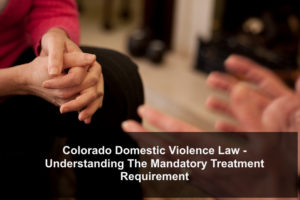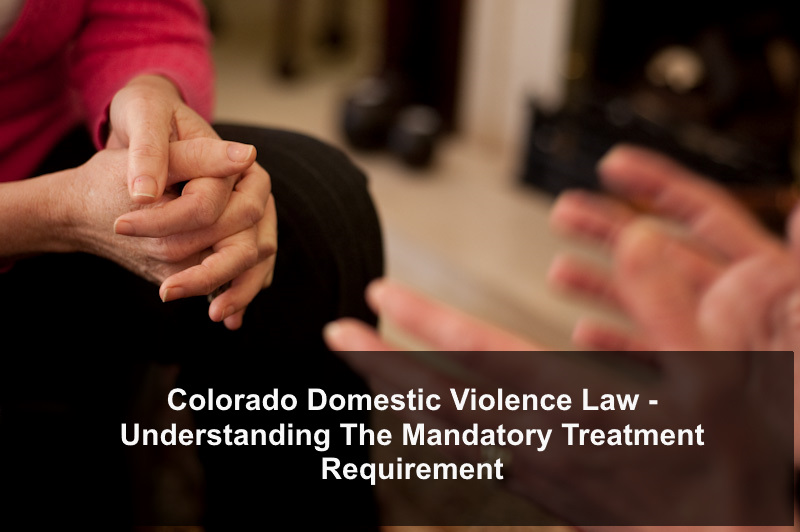




Colorado Domestic Violence Law – Understanding The Mandatory Treatment Requirement
By H. Michael Steinberg Colorado Domestic Violence Criminal Defense Lawyer
 Colorado Domestic Violence Law – Understanding The Mandatory Treatment Requirement – The mandatory domestic violence treatment part of a Colorado Domestic Violence sentencing hearing can be a major surprise to anyone charged and later convicted in these case.
Colorado Domestic Violence Law – Understanding The Mandatory Treatment Requirement – The mandatory domestic violence treatment part of a Colorado Domestic Violence sentencing hearing can be a major surprise to anyone charged and later convicted in these case.
A recent Colorado case has held that one key aspect of Colorado domestic violence sentencing law that requires mandatory counseling is not “punishment.” Domestic violence offenders are required, as a result of a “finding” of domestic violence, to undergo a lengthy and expensive course of treatment that not only includes domestic violence counseling, but can also include treatment programs for drug and alcohol “issues,” anger management and mental health treatment.
This article addresses the distortions that the Colorado Appellate Courts have created to define the domestic violence “enhancement” at sentencing of mandatory treatment as a function of rehabilitation and not punishment.
When The Colorado Judge Finds “An Act Of Domestic Violence”
Under Colorado law Section 18-6-801(1)(a) a Trial Judge is given the authority to make a factual determination that the underlying crime of conviction included an act of domestic violence. If and when that finding is made, that finding mandates a a domestic violence “evaluation” and a course of treatment in addition to any other sentence imposed.
Colorado juries do NOT make this finding at trial. A Judge, and not a jury, determines whether the crime or crimes charged “included an act of domestic violence.”
Here is the language used in the law:
In addition to any sentence that is imposed upon a person for violation of any criminal law under this title, any person who is convicted of any crime, the underlying factual basis of which has been found by the court on the record to include an act of domestic violence, as defined in section 18-6-800.3(1) C.R.S.
. . . shall be ordered to complete a treatment program and a treatment evaluation that conform with the standards adopted by the domestic violence offender management board as required by section 16-11.8-103(4), C.R.S.
The law does not stop there. In a Colorado domestic violence case, once the “label” or “tag” of domestic violence is factually tied to the case, Colorado law actually prohibits the District Attorney from removing the domestic violence label from the case.
While the “tag“ of domestic violence is not a crime in and of itself, it is an enhancement to other criminal offenses such as harassment, assault, trespassing, and destruction of property which forms the foundation for the domestic violence finding.
Bottom line, when the Judge finds the that there is a “factual basis” for a finding of domestic violence, the Court must order:
- A Domestic violence evaluation
- Domestic violence treatment (usually 36 weeks or more)
- A Mandatory protection order
- The Loss of the right to possess a firearm (pursuant to Federal Law)
Colorado’s domestic violence statute actually limits the qualifications for those who must perform domestic violence treatment as a probation to those individuals who:
(1) have committed an act of domestic violence;
(2) would benefit from such treatment; and
(3) would not pose a risk to victims or potential victims. § 16-11.8-103(4)(a)(I); §18-6-801(1)(a).
It is not unusual for a person convicted of a crime of domestic violence to reject probation and to serve a jail sentence rather than comply with what can be for some – the onerous requirements of Colorado domestic violence probation.
What Is An Act Of Domestic Violence?
Under Colorado Law, “Domestic Violence:”
…includes any crime, “when used as a method of coercion, control, punishment, intimidation, or revenge and directed against a person with whom the actor is or has been involved in an intimate relationship.” § 18-6-800.3(1).
Domestic violence also includes “any other crime against a person or against property, or any municipal ordinance violation against a person or against property when used as a method of coercion, control, punishment, intimidation, or revenge directed against a person with whom the actor is or has been involved in an intimate relationship.” (Colorado Revised Statutes Section 18-6-800.3(1).
An “intimate relationship” is further defined as “a relationship between spouses, former spouses, past or present unmarried couples, or persons who are both parents of the same child regardless of whether the persons have been married or have lived together at any time.” (Colorado Revised Statutes Section 18-6-800.3(2))
(Note: To be deemed domestic violence, the couple involved does not need to be sexually intimate. They merely need to represent themselves as a couple, of different sexes or the same sex.)
Certain Colorado crimes are typically charged in Colorado Domestic Violence Cases.
These are:
Third Degree Assault: A Class 1 Misdemeanor – 6 to 24 months in jail.
Harassment: A Class 1 Misdemeanor – 6 to 24 months in jail or a Class 3 Misdemeanor – Up to 6 months jail.
Menacing: A Class 3 Misdemeanor – up to 6 months jail.
Criminal Mischief: A Class 1 Misdemeanor – 6 to 24 months in jail or a Class 2 Misdemeanor – up to 12 months jail.
A Surprising Example – The Colorado Harassment Charge For Text Messaging
In Colorado, a person may be found guilty of harassment where he or she directly communicates with a person by text message ….
“in a manner intended to harass or threaten bodily injury or property damage.”
§ 18-9-111(1)(e), C.R.S.
Here is the entire section from Colorado’s Harassment statute:
§ 18-9-111. Harassment–Kiana Arellano’s law
(1) A person commits harassment if, with intent to harass, annoy, or alarm another person, he or she:
(a) Strikes, shoves, kicks, or otherwise touches a person or subjects him to physical contact; or
(b) In a public place directs obscene language or makes an obscene gesture to or at another person; or
(c) Follows a person in or about a public place; or
(e) Directly or indirectly initiates communication with a person or directs language toward another person, anonymously or otherwise, by telephone, telephone network, data network, text message, instant message, computer, computer network, computer system, or other interactive electronic medium in a manner intended to harass or threaten bodily injury or property damage, or makes any comment, request, suggestion, or proposal by telephone, computer, computer network, computer system, or other interactive electronic medium that is obscene; ....
Even a text to your boy or girl friend, may be in violation of this law and may be found to have been an “act of domestic violence.”
If you are found guilty of an act of domestic violence, you will be ordered, as a condition of your probation to take a mandatary domestic violence course of treatment as determined by probation.
Understanding The “Order For The Conditions fo Colorado Probation”
Under Colorado Law Section 18-1.3-104(1)(a), C.R.S., a Judge will order probation under the following circumstances:
When it appears to the satisfaction of the court that the ends of justice and the best interest of the public, as well as the defendant, will be served thereby, the court may grant the defendant probation for such period and upon such terms and conditions as it deems best.
The length of probation shall be subject to the discretion of the court and may exceed the maximum period of incarceration authorized for the classification of the offense of which the defendant is convicted but shall not exceed five years for any misdemeanor or petty offense. § 18-1.3-202, C.R.S.
Although a Colorado domestic violence convictions mandate an onerous domestic violence evaluation and treatment program, the Colorado Court of Appeals has found that the mandated domestic violence treatment program, like other conditions of probation, is NOT a penalty.
The Colorado Courts of Appeal applies a “seven-factor test” to determine whether a term of a sentence imposed by a Colorado Judge imposes a form of punishment.
The seven-factor test to determine whether a sentence is punitive in nature is as follows (forgive the legalese):
1. whether the sanction involves an affirmative disability or restraint,
2. whether it has historically been regarded as a punishment,
3. whether it comes into play only on a finding of scienter,
4. whether its operation will promote the traditional aims of punishment — retribution and deterrence,
5. whether the behavior to which it applies is already a crime,
6. whether an alternative purpose to which it may rationally be connected is assignable for it, and
7. whether it appears excessive in relation to the alternative purpose assigned are all relevant to the inquiry, and may often point in differing directions.
Conditions of Probation – Such A Domestic Violence Treatment Programs Are NOT Regarded As Punishment In Colorado
The Colorado Courts of Appeal have found that domestic violence treatment programs prioritize rehabilitation as well as victim and public safety and are therefor “not analogous to traditional forms of punishment,”
And
…to the extent the domestic violence treatment program imposes burdens on a defendant, they are not excessive.
The Colorado Courts of Appeal have held in this regard:
We recognize that the domestic violence treatment program “is not without some burdensome consequences to the defendant in terms of cost and duration, but treatment is primarily directed toward achieving the salutary goal of preventing and terminating domestic violence and therefore does not impose an excessive burden on defendants.”
Successfully Getting Through The Mandated Colorado Domestic Violence Treatment Program
One of the best sources of information on Colorado’s Domestic Violence treatment program requirements can be found by following this LINK
In short, to be successful in a Colorado Domestic Violence Treatment Program your participation will be reviewed using the following criteria from the Domestic Violence Offender Management Board, Colorado Division of Criminal Justice – It is ALWAYS a good idea to learn the expectations of those in the Colorado criminal justice system.
Some Practical Advice – An Information Sheet for Domestic Violence Offenders Regarding Required Domestic Violence Treatment
The law requires a person who is convicted of a crime, the underlying factual basis of which involves domestic violence (DV) offense, to complete an evaluation and follow treatment as recommended (§18-6-801 C.R.S). .
Treatment requires you to participate.
The following are some of the factors for deciding your level of DV treatment:
- criminal history;
- drug or alcohol issues;
- mental health issues;
- use or threatened use of weapon;
- safety concerns for the victim and the public;
- employment status; etc.
There are three levels of treatment. You must do an evaluation which includes a risk assessment with a state approved treatment provider. Once your treatment level is determined, a treatment plan will be developed. This plan will be reviewed every two to three months by a multidisciplinary team and may be modified based on your progress.
Some of the circumstances that can affect the length of treatment:
- your group attendance or lack thereof;
- your degree of willingness to learn;
- your participation in group;
- any new criminal activity during treatment;
- following court orders and treatment plan;
- continuing your abusive actions and behavior;
- demonstration of financial responsibility, etc.
Treatment completion is based on understanding and applying your treatment goals. It is not based on a set length of time you are in a program.
To succeed in a domestic violence treatment program – you must:
- actively participate in treatment,
- learn and demonstrate new skills in your life such as accepting responsibility for your abusive behavior and understanding how it impacts others,
- demonstrate accountability for actions,
- use tools to prevent conflict such as timeouts,
- use appropriate communication skills, eliminate abusive behaviors,
- understand various types of abuse, and
- reduce your pattern of power and control behaviors, etc.
For more information and/or refer to the Standards at the following LINK:
Understanding what is expected of you means you have a better chance of success and avoiding a probation violation.
Colorado Domestic Violence Law – Understanding The Mandatory Treatment Requirement
If you found any of the information I have provided on this web page article helpful please click my Plus+1 or the Share buttons for Twitter and Facebook below so that others may also find it.
The reader is admonished that Colorado criminal law, like criminal law in every state and at the Federal level, changes constantly. The article appearing above was accurate at the time it was drafted but it cannot account for changes occurring after it was uploaded.
If, after reading this article, you have questions about your case and would like to consider retaining our law firm, we invite you to contact us at the Steinberg Colorado Criminal Defense Law Firm – 303-627-7777.
Never stop fighting – never stop believing in yourself and your right to due process of law. You will not be alone in court, H. Michael will be at your side every step of the way – advocating for justice and the best possible result in your case. H. Michael Steinberg is passionate about criminal defense. His extensive knowledge and experience of Colorado Criminal Law gives him the edge you need to properly handle your case
 ABOUT THE AUTHOR: H. Michael Steinberg – Email The Author at:
ABOUT THE AUTHOR: H. Michael Steinberg – Email The Author at:
A Denver Colorado Criminal Defense Lawyer – or call his office at 303-627-7777 during business hours – or call his cell if you cannot wait and need his immediate assistance – please call 720-220-2277.
“A good criminal defense lawyer is someone who devotes themselves to their client’s case from beginning to end, always realizing that this case is the most important thing in that client’s life.”
You should be careful to make a responsible choice in selecting a Colorado Criminal Defense Lawyer. We encourage you to “vet” our firm. Over the last 40 plus years – by focusing ONLY on Colorado criminal law – H. Michael has had the necessary time to commit to the task of constantly updating himself on nearly every area of criminal law, to include Colorado criminal law and procedure and trial and courtroom practice.
Putting more than 40 years of Colorado criminal defense experience to work for you.
H. Michael works hard to get his clients the best possible results in and out of the courtroom. He has written, and continues to write, extensively on Colorado criminal law and he hopes this article helps you in some small way – Colorado Domestic Violence Law – Understanding The Mandatory Treatment Requirement.

Other Articles of Interest:
- The Colorado Domestic Violence Multi-disciplinary Treatment Team (MTT) Approach to Mandatory Domestic Violence Treatment Requirements
- The New Colorado DV Treatment Standards
- Understanding The Difference Between Colorado Domestic Violence And Actual Domestic Abuse
- 2011 Colorado Domestic Violence Treatment Providers By County – Boulder County
- Colorado Criminal Domestic Violence Sentencing Procedures and Law – What Happens In A Colorado Domestic Violence Sentencing Hearing












